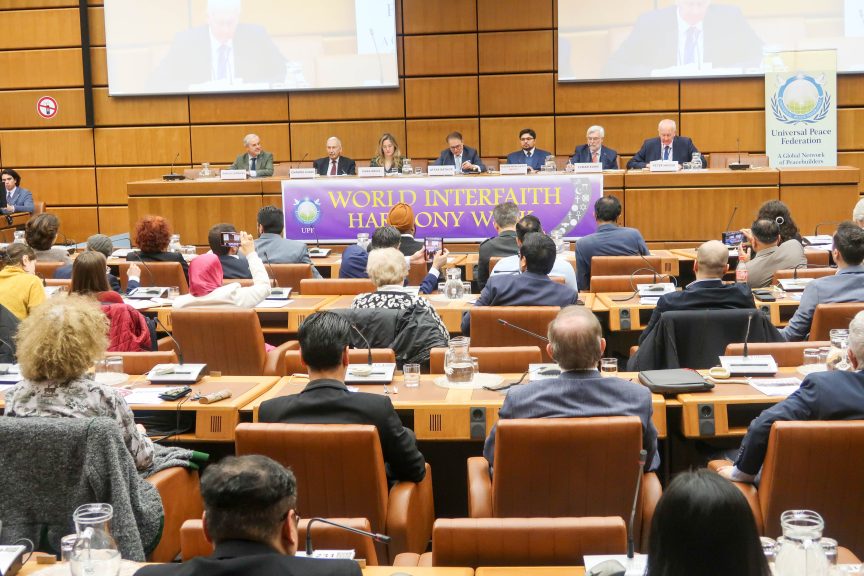
Building a Peace Narrative at a time of Global Crisis: The Contribution of Religion
More
2024-02-02
City: Wien
+436502588846
Organizer
Universal Peace Federation
Location
Vienna International Centre
Email
Vienna, 05.02.2024 (Catholic Press Agency) A high-level conference at the United Nations in Vienna has highlighted the contribution of religions to the creation of "peace narratives" in times of crisis and conflict. Today's "pessimistic narratives" often lead to hatred, extreme violence and refugee crises, said Jean-Luc Lemahieu, Director of the United Nations Office on Drugs and Crime (UNODC), at the conference held on Friday as part of the UN World Interfaith Harmony Week, which is always held at the beginning of February. Religions could bring about a positive change, convey hope and act as "catalysts" in society and politics.
In the age of globalization, every faith needs "enlightened people who can examine their sacred scriptures and traditions and recognize the aspects that can benefit humanity as a whole," said peace activist Peter Haider, President of the Universal Peace Federation (UPF) Austria, on whose initiative the conference came about. In addition to UNODC, the campaign was also supported by the United Nations Correspondents Association Vienna, the Coalition of Faith-Based Organizations (CFBO), Youth and Students for Peace and the Women's Federation for World Peace.
More "courage" needed
Since narratives are fed by emotions, purely rational argumentation and genuine dialog in the search for a compromise often fail, noted CFBO President Prof. Elmar Kuhn. The religious scholar, who is also General Secretary of "Christians in Need", called for the "narratives of death, blood and terror" to be countered by the "narratives of life and peace" in order to "build walls against hatred and violence". Kuhn saw this as a particular challenge for religions. From the treasure trove of their messages of revelation, spirituality and "power for reconciliation and peace", they should "work more courageously into society" and create "bridges to hope and tolerance" with their narratives.
Approaches to reconciliation in conflicts were presented from several perspectives at the conference. For example, the chargé d'affaires of the Kingdom of Jordan in Austria, Rana Abida, referred to her country's experience and expertise in developing solutions to the major issues in the Middle East. The former diplomat and environmental protection entrepreneur Afsar Rathor moderated the discussion with almost 300 participants and shared his experiences of reconciliation work between Hutu and Tutsi after the genocide in Rwanda. Albania was also mentioned as a positive example: the Balkan country is exemplary for its model of religious tolerance and coexistence, said linguist Prof. Manjola Zacellari. Families and investment in education are an important key to this.
Approaches from the religions
Peace approaches from the religions were also discussed as examples. Forgiveness, self-knowledge and reconciliation are indispensable elements of a path to stable peace, explained the Viennese physician and theologian Prof. Johannes Huber, using the Lord's Prayer as an example. Prof. Hussain Mohi-ud-Din Qadri, Deputy Chairman of Minhaj University in Lahore, Pakistan, emphasized that appreciation for a Christian ruler was at the beginning of the Islamic tradition. Mohammed had sent Muslim families who had fled to the King of Abyssinia and described him as a "source of truth". In Pakistan, despite the often different reality, efforts are made to preserve the freedom of religious minorities.
The Viennese physicist Prof. Ille Gebeshuber spoke about the Pope's encyclical "Laudato si". Comprehensive solutions are needed in view of the highly complex challenges of the present, whereby it is better to take "a thousand small steps rather than delayed measures". Committed individuals could contribute a great deal to a sustainable future, said the President of the Austrian Catholic Academics Association. Peace must be achieved on the three levels of resources, culture and religion in order to resolve conflicts permanently and prevent wars. The narrative for this must be based on truth, compassion and respect for life.
Moving from theory to practice
Finally, a call to move from theoretical discussion about religion to the practical implementation of love and compassion came from US writer and filmmaker Joshua Sinclair. The essence of peace is "understanding and accepting suffering", with the contribution of religions to alleviating the suffering of the marginalized, weak and needy being the true test of their teachings. Elisabeth Maria Ziegler-Duregger from the United Religions Initiative (URI) gave practical examples of this, including an interfaith aid project that supports 700 children, women and senior citizens in northern Syrian refugee tents with food, water and sanitation. The expert called for a global debate on the responsibility of supporters of military actions; laws should hold individuals personally accountable, she pleaded.
